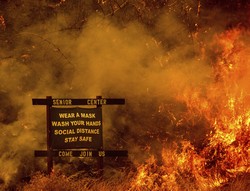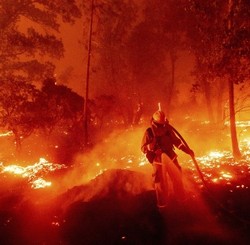Nothing beats September weather. Crisp air, lukewarm temperatures, warm breezes, the transition from summer to fall is absolutely breathtaking. But have you noticed that this past week’s forecast has been “cloudier” than usual? Contrary to popular belief, those “clouds” are actually plumes of smoke being produced from the record-breaking wildfires that have been impacting California, Washington state, and Oregon.
The west coast’s dry conditions, high temperatures, and abundance of lightning have all served as catalysts for these wildfires. According to an article written by BBC News, the fires were so extreme they destroyed thousands of homes, killed over 30 people, and overall affected 42,000 people in the area. Individuals in the area have been experiencing one of the worst air quality conditions on earth.
With the smoke stretching over 5,000 miles, scientists predict the acrid yellow-green smog may linger in those parts for weeks. The air was so thick that one airline stopped flights to Portland, OR, and Spokane, WA, earlier this week. Businesses have closed temporarily and residents were not able to go outside for walks.
Not only has the smog impacted the air quality of these areas, but it has been inducing mass amounts of pollutants. According to an article published by sciencedaily.com, NASA’s satellites indicated high-altitude concentrations of carbon monoxide that are more than 10 times the norm. Scientists have concluded that these fires are the worst they’ve ever been in 18 years.
John Morano, Professor of Journalism and Environmental author, explained the potential complications this environmental catastrophe can have on the earth’s ecosystems.
“There can be costly ripple effects resulting from events like this. The California wildfires will not bode well for ecosystems and creatures that are already stressed on multiple fronts by climate change, human encroachment, deforestation, invasive species, as well as many other pressures. While it’s true that in some ways the forest can be quite resilient, this tends to happen when there isn’t a tsunami of pressures being exerted on wild places simultaneously,” said Morano.
On a brighter note, the smoke coming from these fires has been producing vibrant sunsets all throughout the United States. The combination of haze coming from the smoke and cirrus clouds has created some beautiful views in the Midwest and the Northeast.

Moreover, according to an article written by michiganradio.org, Nick Schroek, a professor of environmental law at the University Detroit Mercy, expresses that the particulate matter in the air has not increased. This is a good sign since an increase in particulate matter can be harmful especially to those with respiratory issues. However, he feels that climate change is the main contributor to the severity of these fires.
Kayla Kennedy, a junior communication student, expressed her position on this issue.
Junior science student Emily Vasquez expresses contrasting thoughts on the fires.“We should genuinely be concerned, especially when the skies are turning orange because of the fires. People don’t realize how powerful the element of fire is. It can be destructive in the tiniest of ways but when it spreads across multiple states it basically becomes next to impossible to stop it. Our environment is changing and based off of these fires it’s not for the best,” said Kennedy.
“I don’t think the smoke will have a lasting effect on the health of the environment, I think it is somewhat of a passing event. Perhaps wherever the smoke and dust settles it’ll be good for nature since they are essentially dissolved plant nutrients. However, trees and plants store carbon, and when deforestation and burning happens, there’s less plants to absorb carbon in the atmosphere which contributes to climate change. A lot of carbon is being released into the atmosphere right now and I can imagine even more will due to these fires,” said Vasquez.
With climate change increasing more and more, these fires are another reason why individuals should think more sustainably. Recycling, using less nonrenewable resources, and shopping locally are a few simple ways to make your lifestyle a little less wasteful. By paying attention to one’s actions and how it affects the environment, change can be made for the better.
IMAGE TAKEN by Los Angeles Times
PHOTO TAKEN by Associated Press




